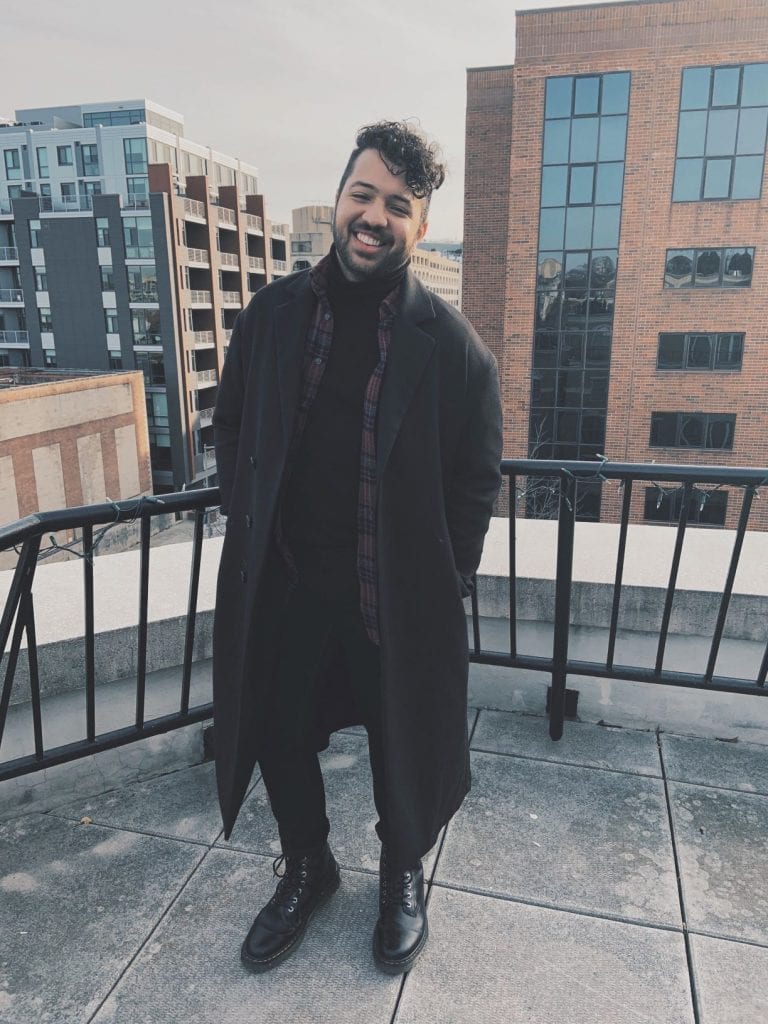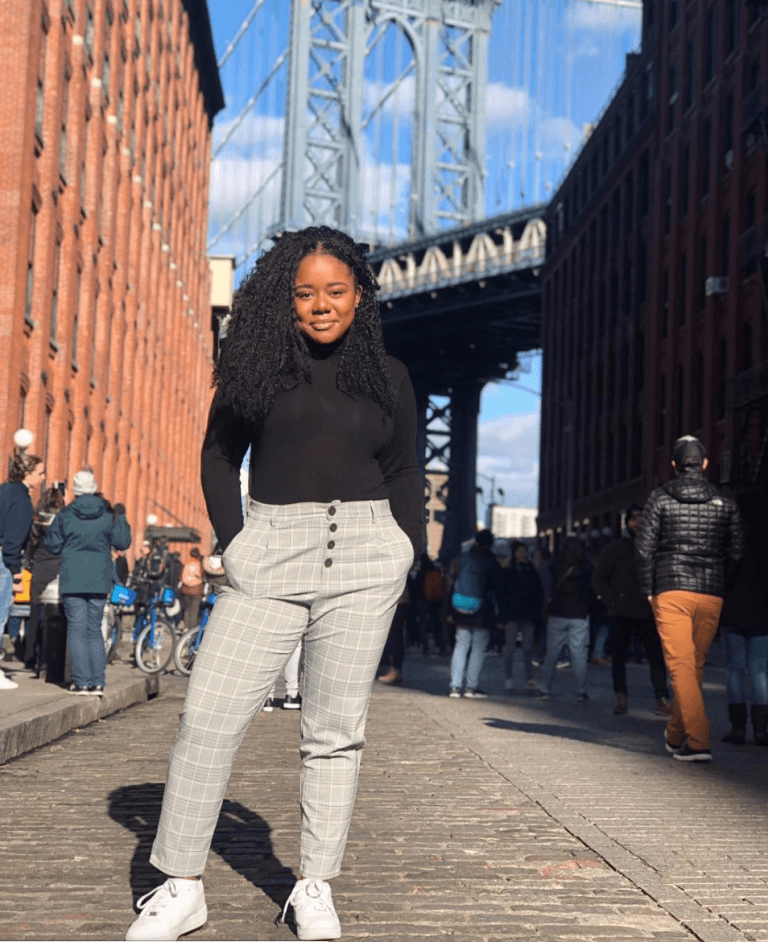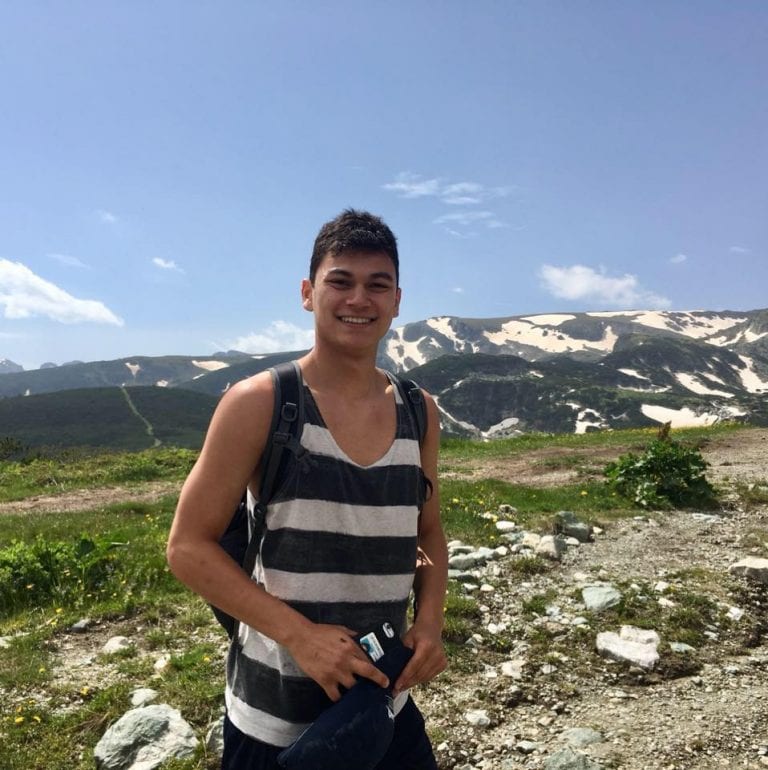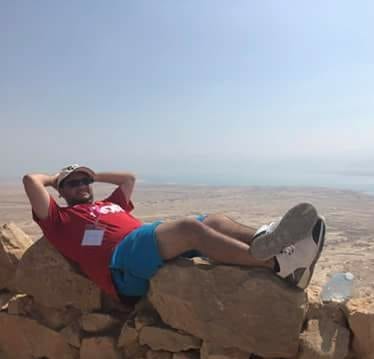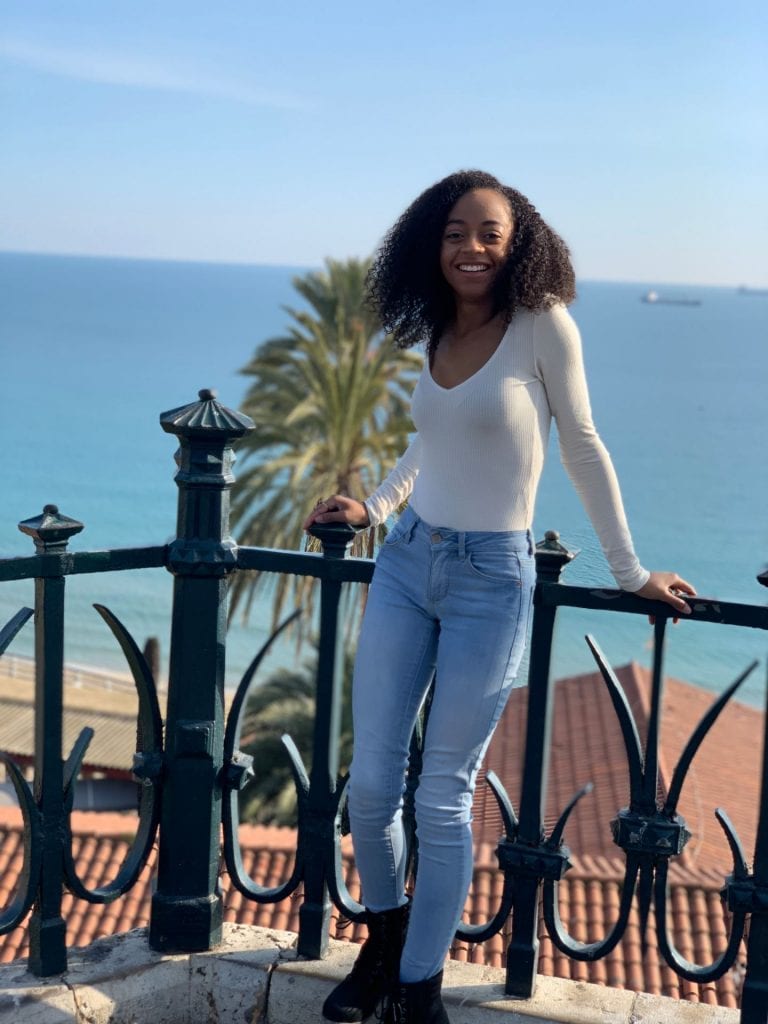As I type this, I’m sitting down on my bed back home in the United States for the first time in what feels like centuries. It was a whirlwind of travelling, and my phone has changed back to Eastern Standard Time, but my body hasn’t. I have been reflecting on the different aspects of being abroad and going through all the things I’ve learned and the ways I’ve changed, and I can truly say, it has been a transformative experience. At every point in life, we always tend to think that we know ourselves fully and completely, only to be proven wrong the next day – and I think this is true for me. While my core identity didn’t necessarily change, I have gained a new perspective in understanding myself and the world around me that I wouldn’t have had if I had not lived in another country for a few months. One of the main things that I’ve realized this semester is that the world is always much bigger than we imagine it. Of course, this sounds like a no-brainer, but it’s something that we don’t actively think about on a daily basis. In America, if you grew up here, chances are you spoke English and saw the world through a very Americanized lens. It makes sense because on a daily basis, we aren’t necessarily interacting with a different language or a different culture because, well, we’re usually surrounded by Americans (in all the different meanings of the word). But going abroad opened my eyes to entirely different ways of looking at the world. There are other governments, other clothing trends, other movies, other EVERYTHING that we as Americans don’t even realize exists because it falls outside of our daily orbit. Having this type of experience makes you question what you know the world to be in such a way that it makes you want to see more and more and more of it. If studying abroad has given me anything, it is the intense desire to keep traveling and exposing myself to different experiences. I think it is going to be very hard to leave the study abroad mindset and revert back to an American idea of things. But, if anything, having this experience has reminded me that it is possible to do your own work and fill in the gaps even when you don’t always have access to another culture or city or language. And I think that is what is going to help me adjust to being back from abroad, is keeping in touch with all of the friends I made in different countries and texting them in their language to practice and sharing part of myself with them just like they’ve done with me. There’s a whole world full of people that you’ve yet to meet, and just going up to someone and saying “hi” has made all the different in my experience abroad, and it gives me something to look forward to as I hope to remain connected to this amazing and interesting community that I was, if only for a few months, a part of.
Author: smatthewman
Saying Goodbye
My time in Jordan has allowed me to grow culturally, academically, and emotionally. In my past few blogs, I focused on the positive parts of my experience, but on this last blog I would like to point out some of the things that I struggled with and talk about how I overcame them in the hope that anyone else who is planning on going to Jordan can be well equipped should they face any similar experiences. While I have fallen in love with Jordan’s hospitality, rich history, and warm culture, it is important to recognize the things that made it a little difficult to live here.
The culture is very family-focused and social and, as a person who’s lived in America’s hyper-individualistic society for some time, this can become a big change. Privacy is almost non-existent in my home stay, and I have felt as if I cannot be alone in my room because my host mom may think something is wrong with me. At first, I thought it was kind of her to want to spend so much time with me, but progressively I found myself needing “me time”. Therefore, I began to tell my host mom that I wanted to nap, enabling me to finally get some much-needed alone time.
Another challenge of everyday life is the sexual harassment and catcalling women in Jordan face on the streets. Because we are foreigners, don’t look like most Jordanian women, and are typically likely not wearing a veil, we experience harassment a bit more than Jordanians. This at times made me feel uncomfortable, unsafe, and very frustrated. However, I cannot provide a solution to this so my advice is to always travel in a group and to learn to ignore them. Just keep your head up high and move on with your day and remember that some men’s inappropriate behavior does not reflect the behavior of all Jordanian men.
The final challenge that I have been struggling with these past two weeks is facing the reality that I’m going back to the United States. I have loved my life in Jordan and there is so much more that I would like to see and do. The memories I’ve made, the people I’ve met, and the places I’ve fallen in love with are something I am not ready to give up. My time in Jordan flew by, and while I faced the difficulties mentioned above, it truly has taken a part of my heart and I do not have any advice on how to deal with leaving. So if you’re going to Jordan, take advantage of this opportunity, cherish all the memories and people you met, and remember to stop and take it all in, because time flies.
El Fin
I am officially back in the United States and all I can think about is the home and life that I created in Barcelona. Being back has been different, and I feel as though there is a lot to be done, but I am still trying to get through the clutter of jet lag and figure out where to start. Processing this entire experience has been hard, especially with these last four months feeling so unreal. I've spent the last four months volunteering with kids who know nothing about the world I come from, and some of them could hardly even imagine it. I go to an amazing university and have always prided myself on being smart, so it was incredibly humbling to meet 4 and 5 year olds who can speak 3 languages, meanwhile I'm still trying to perfect my Spanish, which I have been learning since elementary school. While abroad, I am so proud of myself for overcoming the language barrier. My Spanish has gotten so much better, and after awhile, I was no longer afraid to just put myself out there and try to talk. I feel like I learned so much more by just trying, even if what I was saying did not come out perfectly. When I get back to GWU, I do want to continue this kind of work and service, so hopefully I am able to find some type of volunteer work with kids that will work with my schedule. Barcelona taught me so much and it gave me so much, and I can't wait to give back.
The Home Stretch
Well I officially have less than one month until I return home to New York-- I can't believe study abroad is almost over! I'm going to miss Tel Aviv and Israel so much and cannot explain how incredible this experience was. I would do it again in a heartbeat!
However, before I leave I have a ton of final papers and projects to do (about 7) which is becoming difficult to complete because the weather has been absolutely amazing (aka lots of beach days)! I'm really going to have to buckle down and get all of them done before I leave.
Although I love Israel, I'm also really excited to be going home! My mom was able to visit me this week but I haven't seen my dad since I left so I'm mostly excited to see him. Also, I miss Long Island food! Bacon egg & cheese sandwiches, great Italian food, etc-- Israeli food is great but it just doesn't compare.
What I will miss about Israel is something I cannot put into words-- the people, the food, the beach, my friends, everything! I feel so at home in Israel and will definitely be back several times in my life. If you have the chance to study abroad, and you're particularly interested in the Middle East, I highly recommend studying in Israel. Even if you can't study abroad here, please try to come visit this beautiful country and understand its people, culture, politics, and history because it is really worthwhile!
This is my final goodbye! Shalom!
Just Another Volunteer
Yesterday, my host mother politely asked me if it was possible that I move into the guest bedroom during my last two days in the program. She told me that an IES Rabat summer exchange student will be beginning his or her program those two days before I leave, and he or she will be moving into my bedroom. After all that my host mother had done for me, of course I said yes. But I would be lying if I said it didn’t sting a little. For the past five months I’ve felt as if I was someone special in my homestay. Like I was a part of the family. Like I was her son.
And I still was. My host mom packed me lunches, changed my sheets, and would cook cous cous in the masses for me to share with her and her five actual sons. I was a part of the family, but in a week, I would be going. Replaced by another IES Rabat exchange student in my final days. To be completely honest, I felt slightly annoyed that I would be moving out of my bedroom to make way for my replacement. Sort of like when the youngest child realizes that another baby is on the way; I couldn’t help but feel jealous.
I went for a walk later that day, taking my usual route. I said labas to my hanout man who appropriately smiled back with an L’Hamdulillah and a free Snickers. I walked along the beaches, dabbing up Nabil who urged me to throw on a wetsuit, “The waves are green, not white today, brother.” Even Abdessamad (the youngest of my five host brothers) was out on his motorcycle, screaming khouya at me as he sped by. (Abdessamad spoke no English or French. We communicated through slap-boxing. He was immense, gigantic, capable of fits of cosmic anger, sitting at the world’s border, doing his night watchman’s job. He was an Assas).
It all hit me so quick. There’s going to be a new kid moving into my bedroom. My bedroom. Suddenly, this community that I had worked so hard to become a part of was all going to be gone within a week. Where I lived, I could lose any cop through the nooks and crannies of the medina, I could show you all the best street food spots, and I had made enough friends in the medina to build a football roster. And as of yesterday, I was being reminded that I was just another study abroad student in a homestay that moved exchange students in and out like a freshmen dorm. Yeah, it stung a little.
So, what does this all have to do with my service experience in Rabat. For starters, maybe volunteering is just masturbation. Maybe volunteering is meant for the volunteer to pat themselves on the back for the work that they’ve done, and then return back to the States to proceed with their daily lives. After all, next week I will be replaced by another study abroad student who may also be coming to Rabat with bright eyes, hoping to improve the community through various acts of service. How many exchange students were there before me who volunteered in Rabat?
Yeah, I know. I sound angry. More so like a jealous boyfriend.
Maybe Mr. Healy was right. “Never write with jealousy.” But to that I’d say, I don’t think I’m jealous, I honestly think I’m just writing with sadness. Sad that I’m going to have to leave soon. My previous blog posts speak for themselves. I taught English classes, planted trees, cleaned the beaches, took care of orphaned cats and dogs, helped the homeless, and wrote research papers. However, despite my sad, angry, and jealous state I’m about to contradict myself: those acts weren’t for the benefit of my own self-esteem. If anything, by committing myself to service in Rabat I became closer with the people in the community more than I ever could’ve believed when this program began.
Of course the people of Rabat have gotten used to American students living in their city and devoting themselves to service, but it’s not like they viewed the work that was being done as any less. I’m marginal enough in this city as it is. If anything, volunteering was a mechanism for inclusion, for friendships, and for being accepted into the family. Through the acts of service that I had done, I had demonstrated to the people of Rabat that I didn’t see their home as just another Arab/Muslim country (or “Sandbox” as a stranger had so politely put it). When I taught English or picked litter off the street, I was showing that as an American that comes from a privileged world, I see the beauty in their sandstone streets, and their thundering minarets. I see the preciousness in their religion that calls the country together, or their cous cous fridays that calls families together. The long periods of idleness, the frustrations, the wish to drink out in the open, I loved it all, and I was a part of it all!
At the end of the day, the most important act of service that I had done was showing that I loved Morocco, and that I loved Rabat, and that I loved every face hidden behind the hood of a djellaba.
I cared. And yeah it sounds corny, but if anything, it’s arrogant of me to believe that I will go down as the greatest volunteer Rabat had ever seen. It’s inevitable that I will be forgotten in time, but I’m okay with that. I know that the volunteer work that I had done had made a lasting impact on the friends that I made, because I saw the true value of Rabat. And as a result, I saw the true Rabat.
Maybe that’s the whole point of volunteering. I don’t know.
Israel’s Election #21
Israel at 70 is still a young 21 year old. Israel as a country is 70 years, its history is almost 6,000 years old, and its democratic system turned 21 years old. Two days ago Israel held the 21st Knesset elections. Man was I happy to be in Israel for these elections. Of course as a GW student I take all elections very seriously. So these past couple of weeks I really dove into studying, reading, watching and of course going to debates and discussions about this year’s elections in Israel. Granted I did put in more effort than many people I knew because I thought was going to vote, but I don’t have residency just citizenship. The great Israel fellow of GW gave me great words of advice in saying with voting in Israel every vote counts 10 fold and because of this it’s a lot more responsibility. Well, results came in and Bibi will still be Prime Minister after the coalition part of elections are done. That is basically the quickest way to summarize all of this. I could also tell you the party I wanted most in the Knesset had a Red Line in order to join a coalition - that is for legalization of marijuana. Anyways it is always an amazing experience to participate in democracy and although I didn’t vote I still gave my opinions and still took part in the discussion. Which, without a vote, are two crucial things that one can do. It is also not everything. Remember GOTV. I’m on break now, very happy about this. I can finally not worry about assignments to do all the time, but to keep pushing myself. I’m still going to work through this break a little bit. The most exciting thing I’m looking forward to on this break is a three day hike I will be taking from the Mediterranean sea to the Sea of Galilee. That’s all folks, Israel is just as young as we all are, but only at its heart, and that is how many times they have held democratic elections. That’s right all those people who don’t like Israel it is the one place in this part of the world with a democratic system.
A culture of many cultures
Maybe it doesn’t have water, but Jordan sure is rich in culture and history. In these past three months, I’ve had the honor of learning from Amman’s rich history, amazing sights, and from people’s stories of religious tolerance and cultural identity. Jordan is known around the world for its devotion to peace and humanitarian efforts as it takes in thousands of refugees every year and provides them with the safety and security they can’t find in their own countries. Because of this, Jordan has an incredibly diverse population filled with many different cultures, religions, and identities; yet, somehow, the spirit of unity and tolerance is preserved.
I was witness to this in what became one of my favorite experiences here in Jordan as I took a taxi to school one morning and met one of the kindest drivers in Amman. Immediately after I got in the car, my driver, Khaled, demonstrated genuine interest in who I was and where I came from. I shared that I was from Costa Rica, but I had migrated to the United States when I was younger and was completing my studies there. Enthusiastically, he told me he had moved to Jordan from Palestine when he was young and that Jordan had provided him with opportunities he wouldn’t have had if he had stayed. He shared that his parents had made the difficult decision to leave their home, because they wished to provide him and his brothers with a safe life and better opportunities. Curious, I asked him if he struggled to find an identity as a Palestinian in Jordan. He explained that because of Jordan’s diverse nature and continuous acceptance of refugees, he had been able to take on the Jordanian identity proudly while also identifying as Palestinian. He told me that his background would always be Palestinian, but that he also identified with the Jordanian national identity for the country had provided him with a safe home and great generosity. As traffic got worse and our time together lengthened, he pointed to the Qur’an sitting on the car’s dashboard and explained that he was Muslim and that he was also thankful to Jordan for allowing him to preserve and practice this identity safely. He then asked me what religion I practiced and I explained that I am Christian. Demonstrating, once again, great excitement, he proceeded to talk about how our religions were similar and how much he admired Jesus as a man of good deeds. He explained how our being able to have these conversations was what made the Jordanian identity so great for him. The genuine interest in learning about my identity, his life story and open-mindedness, and our being able to share our experiences is a reflection of the accepting and welcoming Jordanian society that I have grown to love during this time.
During this last month here, I hope to continue learning about this central part of Jordanian history and society. Even if I don’t get to learn in as much depth as I did with Khaled, I am eternally grateful for this experience for it gave me a more personal glance at this country’s diverse yet tolerant nature.
The Final Stretch
My time abroad is quickly coming to a close and I am feeling very confused about it. I am excited to be returning home to my friends and family, but I am already missing the home that I have created and found here in Barcelona. Volunteering has helped me see Barcelona from a different perspective, and although my schedule with classes can be hectic, I love being able to squeeze in the time to do something that matters to me. Studying abroad is a privilege, and I live in a country that has created walls and boarders, blocking people from the opportunity of creating better lives for themselves, and here I am, in Europe, in a different country nearly every weekend. This experience has been eye-opening and has truly made me face privileges that I was not even aware that I had. I am proud of acknowledging that because in a world where I constantly feel as though I am a minority and I know the struggles that I face because of that, I had to step back and realize that there are people who really do have it worse than me, and that there is so much for me to be grateful for. I feel like working with these kids has shown them that the oh so amazing life that I live in America is not far off from theirs, and that if I am able to do something like study-abroad, they can too. Volunteering has greatly enhanced my study abroad experience because it put me in a position to interact as a local, not just a tourist. Volunteering placed me into someone else's world, and it gave me an opportunity to see life from their eyes. Although my study abroad program is not over quite yet, one way that I plan to continue showing my commitment to my community is by helping other students from backgrounds similar to mine realize that studying abroad is something that they can do, and helping them achieve that.
Midterm Madness
My Dinner with Foreign Service Officers
I cannot believe that I am at the tail end of my abroad program. I’ll never forget my first week of orientation and thinking to myself, “This is going to be the longest semester of my life.”
It wasn’t.
When your weekday is filled to the brim with classes, cultural immersion activities, work, and surfing, it is easy to lose track of the months. But here I still am, writing to you about my service experience that has been so prominent throughout my semester abroad.
The first half of the semester I felt as if I properly committed myself to the community of Rabat through various acts of service. I worked with the poor, became a role model for children, cleaned the beaches and ocean, planted trees, and took care of homeless cats and dogs. The service that I did spanned an array of activities that all came with immediate gratification, where I saw first hand how my actions helped the community. While this was of course rewarding [in that I felt more connected with the people of Rabat] I wanted the second half of my community service journey to focus more so on the long-term affects of service. This comes in the form of research, and I’ll explain why.
Outside of school, I intern at the Moroccan Institute for Policy Analysis (MIPA). This job has been a blessing, and has provided me with so many opportunities. One of which was meeting consular officers from the U.S. Embassy and U.S State Department in Rabat. I was invited to have dinner with a few U.S. State Department foreign service officers, and at the dinner table we discussed the world of foreign service and the work that they did. I asked one officer named Ryan (who everyone called “The Boss”) if he could see the physical results from the work that he and his colleagues were doing.
“Maybe there is a paper I wrote that will help the Moroccan government in the next decade,” he responded, with a smile.
He then proceeded to explain how when you commit yourself to foreign service, specifically in the world of public policy and international affairs, you sacrifice feelings of instant gratification. However, That doesn’t mean that the work you’re doing is any less fulfilling. It just means that it takes a longer process for your work to be recognized, implemented, and then impact the community. Whether it is a paper on the importance of feminism, the hidden LGBTQ community in Morocco, the reception of western media, or the flow of innovation through trade; all research, essays, and studies done are meant to aid the Moroccan community in the long-run.
During the second half of my program I have committed myself to long-term forms of service. Through my internship at the Moroccan Institute for Policy Analysis, I have conducted thorough research on the topic of the acceptance of Islam in the western world. I believe that I have a very unique perspective on this issue, having many Moroccan friends with pretty radical views of the United States and democracy. I draw connections between isolationism to radicalism among young Muslim men, and I also critique American and European cultures for isolating Muslim communities. My paper will be published at the end of the semester on the MIPA website, and I hope that in the long-run my work will be cited, shared, praised, debated or even rebuked. Regardless, I know that I will not see the immediate effects of my work, like my physical acts of service, but I hope that my paper will serve the community of Rabat long after my return back to the states.

